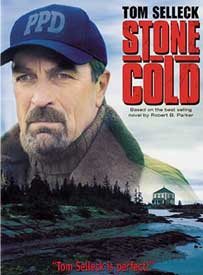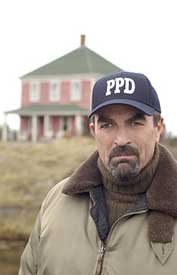 Based on a novel by Robert B. Parker, Stone Cold is a better than average made-for-tv murder mystery, with a surprisingly fine performance by Tom Selleck as quiet tight-jawed small-town police chief Jesse Stone. Formerly an L.A. police officer, he's world-weary & still struggling with alcoholism, yet better equipped than most town cops to deal with the arrival of serial killers who are killing randomly in tandem.
Based on a novel by Robert B. Parker, Stone Cold is a better than average made-for-tv murder mystery, with a surprisingly fine performance by Tom Selleck as quiet tight-jawed small-town police chief Jesse Stone. Formerly an L.A. police officer, he's world-weary & still struggling with alcoholism, yet better equipped than most town cops to deal with the arrival of serial killers who are killing randomly in tandem.
The story walks a margin between realism & movie exaggeration. Most of the characters & situations of the film are muted & down to earth, without the kind of movie heroics or excesses seen in most mysteries as a matter of course -- car chases, shoot-outs, villains whose psychosis is cartoonish, & heros who can leap from moving vehicle to moving vehicle or be knocked the head a few times without suffering concussions or after effects.
Selleck & the supporting cast are real people responding to situations either realistically or in a subdued manner devoid of hystrionics. Even Stone's fuck-buddy relationship with a woman young enough to be his granddaughter was unfortunately realistic, if a tiny bit creepier than the script intended it to be.
But the villains are just a little bit over-the-top: An unctuous married couple kill as a hobby then make love to video tapes of their victims. They're not real-world type villains & their rate of killing (daily in a small town) is even more improbable than themselves. It's odd that a film in the main realistic in tone would not have an equally down to earth murder to solve. But as unreal movie psychos go, this couple is intriguing despite being a little askew from the earthier behaviors & situations for the rest of the cast.
In some ways the film's character array feel like they belong in an ongoing series, & Stone Cold is like a pilot movie to launch a television series. Except that by setting up the idea that the small town of Paradise is only apt to provide a crime of this nature once in a life time, so Chief Stone couldn't be solving a murder a week. On the other hand, on the level of visual presentation & soundtrack as well as the surprisingly high level of acting, Stone Cold has much the appearance of a theatrical release rather than the usual telefilm cheapness.
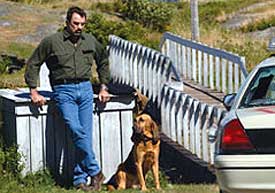 The deserved ratings & success of the first Jesse Stone film opened the door to a potential made-for-tv franchise akin to the Columbo movies, but the second film Jesse Stone: Night Passage (2006) doesn't bode well for the even quality of a film series. As thrillers go both films are tepid for incidence as the free airwaves don't dare show much blood & mayhem even when selecting as their theme a tale of a mob hitman (Stephen Baldwin) in a small town. The deserved ratings & success of the first Jesse Stone film opened the door to a potential made-for-tv franchise akin to the Columbo movies, but the second film Jesse Stone: Night Passage (2006) doesn't bode well for the even quality of a film series. As thrillers go both films are tepid for incidence as the free airwaves don't dare show much blood & mayhem even when selecting as their theme a tale of a mob hitman (Stephen Baldwin) in a small town.
The first film transcended tv-murder-mystery tepidity with a surprisingly subtle character performance, & it was the quiet moments of the film that were so winning. The second film tries to duplicate this with sad moments regarding the illness of an old bloodhound Stone loves. But it smacks of "buy this magazine or we shoot this dog" & Selleck fails wholly to sell it, though sure, sick doggy pulls at the heartstrings in a phony sort of way.
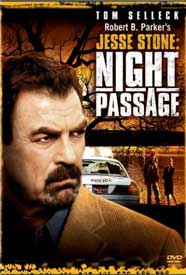 For this prequel, the idea that mob money-laundering & hired hits would arise in a small New England town is way too close to the assumption in Murder She Wrote that old ladies who write cozies in their tiny villages have to solve a real murder each week. For this prequel, the idea that mob money-laundering & hired hits would arise in a small New England town is way too close to the assumption in Murder She Wrote that old ladies who write cozies in their tiny villages have to solve a real murder each week.
There's also the problem of Selleck as "leading man" being provided a leading lady young enough to be his granddaughter (Polly Shannon this time; the flaw will be repeated in most episodes so that he begins to look like a borderline pedarast).
An aging town sheriff porking twenty-somethings would not achieve nor deserve any respect whatsoever. As a man battling alcoholism his behavior might honestly be just that bad, but the script doesn't have him porking kids because he's got issues; he does it because he's the leading man, a hunk despite his age, & casting romantic interests in such films as age-appropriate just rarely happens.
The "mystery" is never mysterious & does not get solved so much as it runs its course & ends. One is left ultimately with lack of mayhem, lack of believability, geezer-with-child romance, & an uninteresting plot without an ounce of mystery in it. The best thing in it is Jesse Stone mooning over whether or not to have his dog put down, & even that wasn't as well done as "how Jesse Stone got a new dog" as told in the previous film.
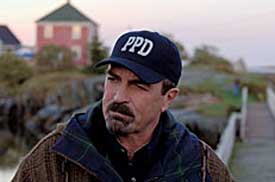 Jesse Stone: Death in Paradise (2006) is the third entry into Selleck's telefilm series. The body of a fourteen year old girl named Billy is found discarded in a lake. Chief Stone rarely shows emotion but at heart is a suffering soulful sort, & it becomes his personal mission to bring her killer to justice. Jesse Stone: Death in Paradise (2006) is the third entry into Selleck's telefilm series. The body of a fourteen year old girl named Billy is found discarded in a lake. Chief Stone rarely shows emotion but at heart is a suffering soulful sort, & it becomes his personal mission to bring her killer to justice.
The plot involves a wealthy sleeze-bag biographer & pedarast who hides in open view as a "philanthropist" who raises charity funds for teenagers so that he can get access to children. His next biography is about druglord Leo Finn & his scary "gunzel" Lovey Nars (when Bogart popularized the word "gunzel" as a name for bodyguard gunman, the inside joke was that it actually indicated a prison "girlfriend" sort of guy; & the present script seems to know about that, even giving him the name Lovey).
But the specifics of the crime & the structure of the simple plot are not as important as Tom Selleck's performance as the laconic borderline-tragic hero & almost-controlled alcoholic, who knows this job as a small town cop is his last stop for an ex-big-city cop who spiraled down.
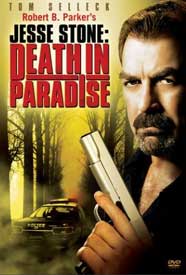 It's nice that Tom is playing his age, & the soulful act really works. He is haunted by the sodden ghost of the murder victim not because it's a ghost story, but because she weighs so heavily on his mind. But his girlfriend Lily cannot see deeply into him & feels there is something in him that is remorseless & unpitying. Maybe if he's screw girls within fifteen years of his own age he might find someone with a little more awareness of life! It's nice that Tom is playing his age, & the soulful act really works. He is haunted by the sodden ghost of the murder victim not because it's a ghost story, but because she weighs so heavily on his mind. But his girlfriend Lily cannot see deeply into him & feels there is something in him that is remorseless & unpitying. Maybe if he's screw girls within fifteen years of his own age he might find someone with a little more awareness of life!
Not that she's totally wrong about Stone. We do need, from each of these films, some little sense of knowing more about who Chief Stone is at the core. We already know he suffers & loves baseball & dogs. When Lily says he is unpitying, it begs us to assess this as a potential aspect of Stone, who pursues the child molester with an unwavering but potentially misguided certainty that the man is also a child slayer. And in the climactic showdown Stone is remorseless, more like a man with a vendetta than a lawman with a desire to bring lawbreakers to justice.
If it ever happens that these films about Chief Stone in the town of Paradise cease to reveal anything new in his character, can no longer convey any growth & progression as a recovering alcoholic, then he might as well have been Columbo making a hundred films about a static, changeless character.
Chief Stone seems a simple character who might not sustain a film series at a level much above that of any series-character detective show. So far, these films have been a little more than static because Tom Selleck so strongly commands the small screen & infuses stone with depth. Only with future Stone adventures will be find out if the character reaches some sort of finality & becomes the usual changeless hero of series television.
In a side-story, the deputy Stone has called "Suitcase" (Kohl Sudduth) since the day they met is seriously injured & in a coma. In previous installments it was made into a minor mystery why Stone calls this guy Suitcase, but we find out near the end of this third film. It's a teency revelation of the sort that adds so much to this character. Suitcase is still in the coma as the story ends, not quite a cliffhanger, but a strong clue that the fourth film was already written.
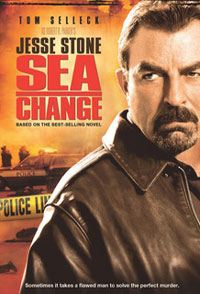 "I'm just a small time cop. Mostly I give out parking tickets" says Jesse Stone in Sea Change (2007). If that were true there wouldn't be Robert B. Parker novels about Jesse Stone, big-city cop exiled to a small town in the Northeast, & there sure as heck wouldn't be a film series about the guy.
"I'm just a small time cop. Mostly I give out parking tickets" says Jesse Stone in Sea Change (2007). If that were true there wouldn't be Robert B. Parker novels about Jesse Stone, big-city cop exiled to a small town in the Northeast, & there sure as heck wouldn't be a film series about the guy.
But it's true exciting crimes have gotten rare of late & Chief Stone is getting bored. And a bored Stone is a drunk Stone.
Jeff Beal has written a moving theme & soundtrack for this series, & the cinematography is well above telefilm averages. Writers change from episode to episode, but so far a single director, & Selleck's dead-on portrayal, gives a unified realism to these films.
I easily lose interest in series movies, but I've been right on board for Jesse Stone from the start. Compared to most crime films they're lowkey; it's the characters who are most worth watching.
Stone's depuity Luther "Suitcase" Simpson is still in a coma from the previous film. Stone sits at the young man's bedside reading him a tale of the sea, & even instructs him how he ought to wake up, like the guy who was in a coma for ten years then just sat right up in bed & said, "I'll have a latte."
Several scenes later Suitcase will do just that, though not otherwise remembering Stone's regular visits. Suitcase isn't quite the same fellow after his coma, but Stone doesn't mind; it means they can both be crazy instead of just Stone. And on the upside, Suitcase seems to have increased his "instincts" for criminology, not quite supernatural, but a bit eerie, & he's just flat out getting to be a more interesting character in each episode.
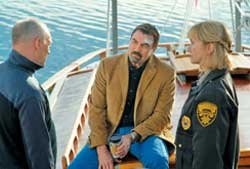 There are two other deputies hanging about the tale. Trusted deputy is Rose Gammon (Kathy Baker). She's a late bloomer in that she's worked for the sheriff's office a long while but only since the arrival of Stone has a mentor who sets her on the road to being an actual crime fighter instead of a paper shufflin' office cop. There are two other deputies hanging about the tale. Trusted deputy is Rose Gammon (Kathy Baker). She's a late bloomer in that she's worked for the sheriff's office a long while but only since the arrival of Stone has a mentor who sets her on the road to being an actual crime fighter instead of a paper shufflin' office cop.
The less trustworth deputy still expects Rose to fetch the coffee, believes he should've gotten the Chief's job instead of bringing Stone in from the outside, but generally remains in the background awaiting his bit in a future episode. We get stronger character roles out of other actors, especially William Devane as Dr. Dix, Stone's friend & shrink.
Stone's still pissin' & moanin' about his ex-wife for whom he carries a sizeable torch; still loves dogs; still a suffering sensitive guy who likes his gals a bit on the young side; & is still butch enough to blow away an avenging giant who seems thrown in the story for the sake of very token action-action.
There are two cases running side-by-side in the story. The big one is a cold case Stone dug out of the files from before he was hired as sheriff. In 1992 there was a bank holdup & kidnapping. The body of a kidnapped bankteller was two years later found in a shallow grave by hunters.
The town council doesn't want old cases dragged back into the news, as tourist dollars could fly south if the town is thought of as a place of crime. Stone has to make a big deal of the old case because he can only stay sober if he's got a serious crime to solve.
That case will lead him to along a rather film noir path to a good-lookin' young woman, tweeking his repetitious May/December horndog interests. The full story of the bank robbery & dead girl could be given away in two sentences because it's not exactly complicated. But all I'll say is it's not badly done, & Stone's choice about what to do when the truth is uncovered is a small suprise.
The parallel story is of a young woman allegedly raped by a yachtsman who certainly is a son of a bitch, but might not be an outright rapist. This part of the tale is a real-seeming small-town story & allows for some good character performances all round.
copyright © by Paghat the Ratgirl
|
